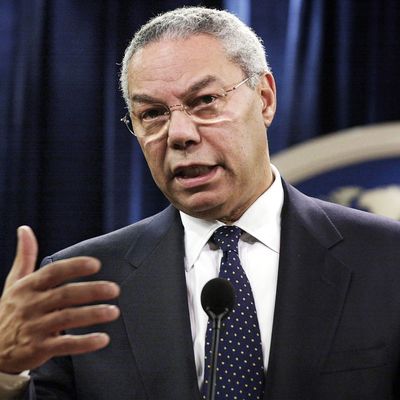
Colin Powell, who helped lead the U.S. through the first Gulf War, then played a pivotal — and disastrous — role in the Iraq War, died on Monday at 84, his family announced. The cause was complications of COVID-19. Powell had been fully vaccinated, but suffered from Parkinson’s disease as well as multiple myeloma.
“We have lost a remarkable and loving husband, father, grandfather and a great American,” Powell’s family said in a statement.
Powell was for many years one of the most visible and highly respected military officials and statesmen in America. Beginning his career as a soldier in Vietnam, he rose through the military ranks to become a national security adviser during the Reagan presidency, then chairman of the Joint Chiefs of Staff under President George H.W. Bush — the first Black person to serve in either capacity. He became a frequent TV presence and household name during the Gulf War, which saw the U.S. and coalition forces achieve a quick and commanding victory over the Iraqi forces that had invaded Kuwait. His reputation remained close to unimpeachable throughout the 1990s, and he was frequently mentioned as a candidate for higher office, a possibility he said did not interest him.
But in 2003, two years after being tapped as George W. Bush’s secretary of State — again, he was the first Black person to hold that position — Powell gave an infamous speech in front of the U.N. that helped pave the way for the Iraq War. Unlike most of the senior figures in Bush’s orbit, Powell had voiced grave doubts about the invasion from the beginning, famously telling Bush of Iraq, “If you break it, you own it.”
Nonetheless, Powell pushed the invasion case for 76 minutes, delivering a forceful address based on intelligence analysis focused on Saddam Hussein’s biological- and chemical-weapon capacities — most of which turned out to be almost completely false. The speech was seen as a key moment in the run-up to the war, particularly since it came from someone seen by the public as trustworthy and nonpartisan.
In contrast to other Bush-administration officials, Powell has long expressed regret about his role in the invasion, calling the U.N. speech a “blot” on his record. “I’m the one who presented it to the world, and [it] will always be a part of my record,” he said in 2005, a sentiment he repeated many times in the years after. He gradually turned away from the Republican Party, endorsing Barack Obama in 2008, denouncing Donald Trump in 2016, and declaring that he could no longer call himself a Republican after the Capitol riots in January.






























